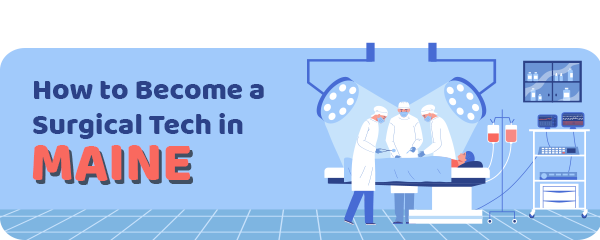In Maine, a dedicated team of healthcare professionals is always on standby, especially in emergencies.
This specialized team consists of:
- Surgeons
- Anesthesia specialist
- Surgical nurse
- Surgical technician
Their collaborative efforts begin before the surgery commences and continue well after it concludes.
These skilled professionals are often referred to by alternative titles such as operation room (OR) techs and scrub techs.
Article Table of Contents
The Role and Responsibilities of Surgical Technologists
Surgical technologists play a pivotal role in the healthcare sector, performing various crucial tasks during their shifts.
These include:
- Preparing patients for surgery
- Transporting patients to and from the OR
- Preparing the OR with surgical equipment and supplies
- Monitoring the instrument count throughout surgery
- Handing the surgeon medical instruments
- Closing wounds and bandaging patients
It’s important to note that the list of responsibilities mentioned above is not exhaustive, as the role of a surgical technologist encompasses various other duties.
Training and Education for Surgical Technologists
Becoming a surgical technologist is a process that begins with a strong educational foundation.
In Maine, aspiring surgical techs need to embark on the following educational journey:
- Start by completing high school or obtaining a General Educational Development (GED) certificate.
- Enroll in a specialized training program designed for surgical technology.
- These programs provide a comprehensive curriculum that covers essential subjects, including microbiology, pathophysiology, pharmacology, anatomy, physiology, and medical terminology.
- Certification in Cardio-Pulmonary Resuscitation (CPR) and/or Basic Life Support (BLS) and/or Automated
- External Defibrillator (AED) is often required.
Various educational institutions in Maine offer surgical technology programs to meet this need.
Bevill State Community College 
The program at this college delves into crucial topics like:
- Sterile processing,
- Infection control
- Sterilization,
- Instrumentation identification,
- Safety
Admission requirements may vary, including:
- A high school diploma or GED
- Accuplacer placement exam
- Military service
- Previous medical-related experience
- Health insurance
- A specified number of completed clinical cases
Calhoun Community College 
This college offers a comprehensive training program that spans approximately two years.
It provides students with classroom, lab, and clinical instruction.
To earn an AAS degree at this college, you’ll need to complete 18 additional general education credit hours.
Admission requirements include:
- Attending a program information session,
- Taking a Manual Dexterity Exam,
- Meeting the college’s admission standards.
Eastern Maine Community College 
This community college extends an opportunity to aspiring surgical technologists through its Associate in Applied Science Degree in Surgical Technology.
The program spans approximately two years and aims to equip students with a fundamental understanding of vital subjects.
These include:
- Human physiology,
- Surgical anatomy,
- Dosage calculations,
- Aseptic techniques in surgical settings.
The cost of annual tuition is estimated to be around $7,000.
Maine Medical Center 
It hosts a School of Surgical Technology, where students can embark on a transformative journey into the world of surgical technology.
This intensive program, designed for full-time engagement, unfolds over one year and is divided into two six-month semesters.
The tuition for this program typically amounts to $3,750.
Students who complete this program at Maine Medical Center’s School of Surgical Technology have the option to leverage their credits toward obtaining an Associate of Applied Science Degree at Southern Maine Community College (SMCC).
SMCC 
It offers a program that underscores the significance of gaining hands-on experience in surgical technology.
The program is structured to be completed in two years, with the first year spent at Maine Medical Center’s School of Surgical Technology.
This foundation is built upon in the second year, where students refine their skills to enhance their employability.
The total cost for this program is estimated to be approximately $7,500.
Upon successful completion, students are awarded an Associate in Applied Science Degree in Surgical Technology.
| School Name | Address |
|---|---|
| Bevill State Community College | online |
| Calhoun Community College | online |
| Eastern Maine Community College | 354 Hogan Rd, Bangor, ME 04401 |
| Maine Medical Center | 22 Bramhall St, Portland, ME 04102 |
| SMCC | 2 Fort Road, South Portland, Maine 04106 |
These educational pathways in surgical technology reflect the dedication of institutions in Maine to prepare students for a rewarding career in the field.
Each program offers a unique approach to education, accommodating different preferences and objectives.
Aspiring surgical technologists can choose the one that aligns with their goals and embark on a fulfilling journey in this vital healthcare profession.
Certification and Career Prospects
In Maine, although surgical technologists may not be legally required to obtain certification, most employers highly value certified professionals.
Various certifying bodies provide certification for surgical technologists, including:
- National Surgical Assistant Association (NSAA)
- Provides the Certified Surgical Assistant (CSA) qualification
- National Board of Surgical Technology and Surgical Assisting (NBSTSA)
- Provides the Certified Surgical Technologist/Certified First Assistant credential
- National Center for Competency Training (NCCT)
- Provides the Tech in Surgery Certification
Out of these, the NBSTSA certification is widely recognized and respected nationally.
This certification entails a comprehensive exam that comprises 200 questions, with a passing threshold of correctly answering at least 119 of them.
The associated exam fee varies depending on membership status.
Certified surgical technologists are required to renew their certification every four years.
The renewal process can be accomplished through either retaking the certification exam (which involves repaying the exam fee) or:
- Completing continuing education courses
- Accumulating 60 education credits within the renewal period
- Paying a renewal fee
Surgical Technologist Salary in Maine
While it may not be the most glamorous profession, surgical technologists in Maine can earn a respectable income.
On average, an operating room technician in Maine can expect to earn an annual salary of around $49,600.
For more detailed information on income variations across different cities within the state, refer to the table below.
Annual Salary Range:| Location | Avg. Annual Salary |
|---|---|
| North Berwick | $52,900 |
| Acton | $51,800 |
| Sanford | $51,800 |
| Wells | $51,700 |
| Shapleigh | $51,600 |
| Alfred | $51,500 |
| Waterboro | $51,300 |
| Windham | $50,700 |
| Yarmouth | $50,700 |
| Saco | $50,600 |
Regional Salary in Maine
| Region | Employed | Avg. Annual Salary | Avg. Hourly Pay | Top 10% Annual Salary | Bottom 10% Annual Salary |
|---|---|---|---|---|---|
| Bangor, ME | 90 | $58,510 | $28.13 | $74,380 | $48,310 |
| Lewiston-Auburn, ME | 70 | $63,380 | $30.47 | $74,660 | $47,000 |
| Portland-South Portland, ME | 250 | $58,710 | $28.23 | $76,060 | $44,870 |
* Employment conditions in your area may vary.
Frequently Asked Questions
What Sills Do I Need To Work As A Surgical Tech in Maine?
Here are the most important skills this profession requires:
- Able to work as part of a team
- Detail-oriented
- Take direction
- Understanding medical terms
- Understanding medical methodology
- Good communication skills
Where Do Surgical Technologists from Maine Find Work?
These technologists usually work in a hospital’s surgery wing.
Furthermore, these other places also hire such specialists:
- Children’s hospitals
- Cosmetic surgery centers
- Specialty clinics for surgical procedures
Can a Surgical Tech From Maine Choose a Specialty?
YES!
Just like surgeons can choose to operate on a specific body part, so can these techs.
Here are the most commonly chosen surgery niches:
- General surgery,
- Ob/gyn,
- Urology,
- Plastics,
- Neurology
Read the full guide: How to Become a Surgical Technologist




